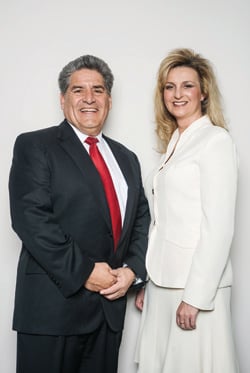Mentors can help fledgling solos

Photo of Andy Gavaldon and Andrea Hall by Matt Nager.
When Fort Collins, Colo., criminal defense lawyer Andrea Hall went solo in 2005, she began aggressively seeking advice from fellow defense attorneys. She even offered to buy them lunch in exchange for tips. One attorney, Andy Gavaldon, offered to become her mentor and let her shadow him in court.
“He was always open to a phone call, always willing to sit down and talk with me,” Hall says. The relationship also was essential to learning the nuances of the state court system, she says.
They got along so well that for a time Hall rented office space from Gavaldon. She helped him with cases that included defending a University of Northern Colorado football player accused of stabbing a teammate and a local priest charged with sexually abusing parishioners.
“That’s how I found my niche in domestic violence and sexual abuse,” she says.
MANY HATS
Mentors, as Hall found, can be legal advisers, business strategists and sometimes even substitute therapists. Mostly, though, they can help solos get a practice off the ground and help keep them afloat.
Some solos seek more than one mentor. “I rely heavily on mentors,” says J.J. Sherman, a Los Angeles real estate attorney who started her solo practice in 2009. She says her mentors include senior executives at a national bank and at a real estate investment trust.
Sherman says her big-firm days taught her the value of mentoring. The process there, though formalized, helped her answer questions about the law and about how to deal with clients.
She now meets with her mentors on an as-needed basis to discuss legal opportunities and to get specific guidance on practice management. One such discussion prompted her to publish a regular newsletter that has led directly to new business.
“When something comes up and I need a piece of advice from them, I get in touch,” Sherman says. “Their inspiration works.”
Sherman also uses the services of the D.C. Bar’s practice management advisers. She regularly calls on the bar’s Daniel Mills for guidance on things such as business strategy and ethics. “Really good mentoring is a chemistry that evolves between the people,” says Mills, adding that his own mentors were instrumental in shaping his earlier career as a litigator.
“What you have to do is seek those people out,” he says. “They’re not going to come to you.”



